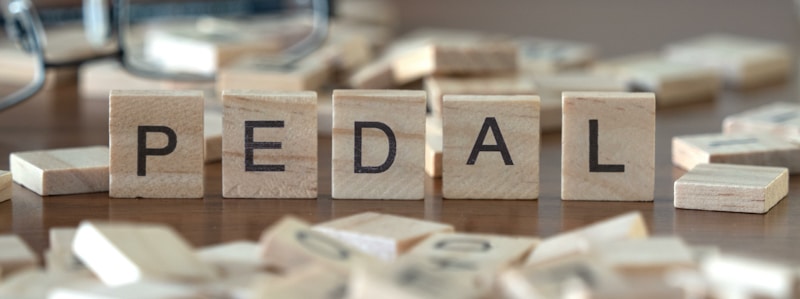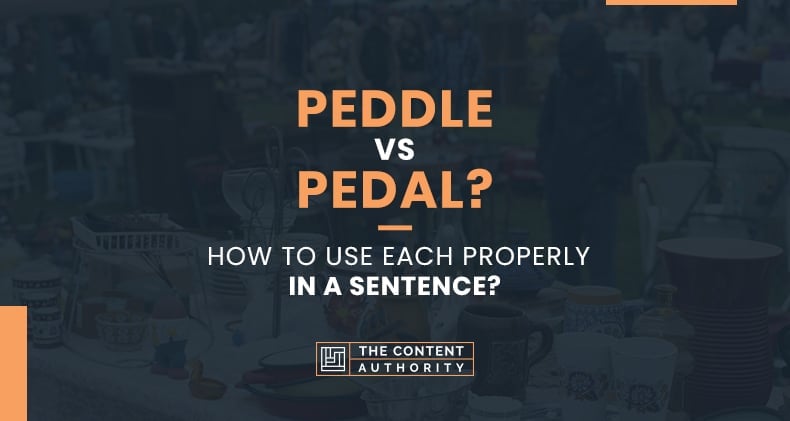“Peddle” and “pedal” are two words that sound the same but have very different meanings. It’s important to understand these differences in order to use them properly.
The word “peddle” means to go from place to place selling small goods. On the other hand, the word “pedal” is used in reference to a pair of foot-operated levers to propel a bike forward.
Of course, this is just one of the many idiosyncrasies that occur in the English language. It’s important to take a closer look at these words so that you can truly understand their differences and be able to use them correctly in the sentences you write.

Etymology of the Word “Peddle”
The word peddle as we know it (to retail or sale small quantities of something) dates back to 1837. It stemmed from the word peddler (a person who was known to sell something that was illegal). However, the word is actually much older than this. In 1530 it was used as an intransitive verb which is a verb that doesn’t allow for a direct object. In other words, you can’t follow this verb with a who or a what.
Two of the other words that are commonly related to the word peddle are the words peddled and peddling. The word peddling actually dates back to 1590 where it was defined as something that was trifling, petty, or even insignificant.
“Peddle” Sentence Examples
Now that you have a better understanding of what this word means, here are some of the correct ways to use it in a sentence:
- There are now some stores who have turned to the internet to peddle their wares.
- While you’ve probably heard of Etsy, the online auction site where people from around the world can peddle their homemade goods, you may not realize that the majority of the commerce on this massive website takes place between average people like you and me.
- There are some authorities on spam who peddle the myth that most spam comes from countries other than the United States.
- Lawmakers would like to peddle the notion that legislation can be used to eliminate racial and religious discrimination.
- Some people don’t realize that bloggers are using their websites to peddle their goods and services.
- They parked their truck at the side of the road and peddled their fruits and vegetables from there.
- People are often suspicious of those who peddle medicine because they think of it as snake oil.
- He got a booth at the local craft store so he could peddle his handmade goods.
- Farmers come to the marketplace in Seoul so that they can peddle their rice.
- Unfortunately he was unsuccessful in peddling his paintings in London’s small galleries.
When and how to Properly use “Peddle”
Peddle is a verb (“to peddle”) that means to sell either illegal or stolen items. It can also be used to promote ideas or views. Oftentimes we’ll encounter this word is used in discussing things like the selling of illegal drugs.
Some of the most common terms that are used with the word pedal include:
- Goods
- Ideas
- Drugs
Peddle is one of those words in English that you can use as either a noun or a verb (a word that’s used to convey an action, occurrence, or state of being). This is because when you’re using the word “peddle” to try to sell something from going place to place you’re performing an action.
Etymology of the Word “Pedal”
The word “pedal” as a noun dates back to 1610 when it was used in reference to the lever on an organ that was worked by your foot. This word came from a few different languages other than English, these include:
- It comes from the French word “pedale” which means a trick that you do with your feet.
- It also comes from the Italian word “pedale” which also was used in referring to a treadle or a pedal.
- It comes from the Late Latin word “pedale” meaning thing of the foot. The neuter of this Latin word is pedalis meaning “of the foot.” This is because pes means foot.
By 1789 the word was extended so that it was being used in reference to any part of a machine that an operator uses to transmit power from their foot to the machine itself. This is why by 1959 pedal steel guitars were common (since the strings’ tension is changed by pedals).
In 1934 we also had the term “pedal-pusher” referring to a bicyclist. Therefore it should come as no surprise that by 1944 the term was also being used to refer to a type of women’s trousers that were suitable for bicycling.
Of course, we also have the word “pedal” being used as a verb. This originally started in 1866 when it was used in reference to musical organs. Then by 1888 it was being used in reference to bicycles as well. It’s important to realize that this came after the growth of the word as a noun. This is because it still references the noun but with applied action.
When and how to Properly use “Pedal”

“Pedal” is a noun (a word that’s used to identify people, places, or things) that’s used to describe a level or treadle. It’s part of a mechanism like a bicycle or a piano. Usually, these are pressed or turned by your foot.
There are some common terms that are used with the word “pedal.” They include:
- Bin
- Bike
- Clips
- Guitar
- Power
“Pedal” as a Noun or Verb
“”Pedal” can also be used as a noun when you’re referring to the pair of foot-operated levers (e.g. throttle, brake, clutch) that are propelled by the use of your legs. These can be found on a piano where when you depress it the dampers can’t stop the sound when you release the keys.
“Pedal” Sentence Examples
Now that you know what the word pedal means, it’s important to know how to use it properly in sentences. With this in mind, here are some of the correct ways you should use it:
- If you’re feeling up to it, you may enjoy renting a pedal boat sometime over the weekend.
- When you press the pedal to the kick-down position you’ll enjoy full power.
- When you’re out in the really deep water you’ll want to ratchet your pedals by doing quarter pedal strokes.
- When you’re first learning to ride a bike you’ll probably feel wobbly and unsure of yourself as you push down on the pedal to propel the bike forward.
- While the art show was amazing, we managed to pull ourselves away so that we could pedal our bikes back to the hotel in time to enjoy happy hour.
- Did you know that anyone who sells a bike must make sure that pedal reflectors are in place?
- I almost got into a wreck when I suddenly released the pedal clutch and floored the accelerator.
- She pressed her foot down on the accelerator pedal.
- You use a foot pedal to operate the sewing machine.
- If you want to stop the machine you should press down on the foot pedal.
Why the Confusion Between “Pedal” and “Peddle”
The reason why “pedal” and “peddle” are so often confused is because they sound alike but, as we’ve seen, they do have very different meanings. These aren’t the only words that have different meanings and uses but sound alike. Therefore they also aren’t the only words that people misuse or interchange. This is because they are what’s known as homophones.
Homophones are words that are pronounced the same but have different meanings. Oftentimes these words are also spelled somewhat differently. However, there are some times when they are spelled the same. It’s interesting to note here that a homophone may apply to phrases, letters, and groups of letters too as long as they’re pronounced as another phrase, letter, or group of letters.
Since the words “pedal” and “peddle” are spelled differently they’re known as a heterograph. Simply put heterographs are words that sound the same as other words but have different spellings and meanings. This is something that will often confuse people who are just learning English for the first time.
Conclusion
Now that you have a better understanding of the words “peddle” and “pedal” hopefully you also have a better understanding of when you should use each of these words. While they definitely sound very much alike, as you’ve been able to see they are actually quite different.
This difference is important to understand so that you can be sure that you’re using them properly in your speech and writing. With being able to understand their different definitions plays an important role here it’s still interesting to note how they’ve changed over the years.
So, when thinking of the mechanism or object used to propel a bicycle forward or similar machinery, we will use “pedal” spelled with “al” at the end. But when referring to the verb “to peddle” and any of its other variants the correct one to use is the one ending with “dle”.
Shawn Manaher is the founder and CEO of The Content Authority. He’s one part content manager, one part writing ninja organizer, and two parts leader of top content creators. You don’t even want to know what he calls pancakes.


